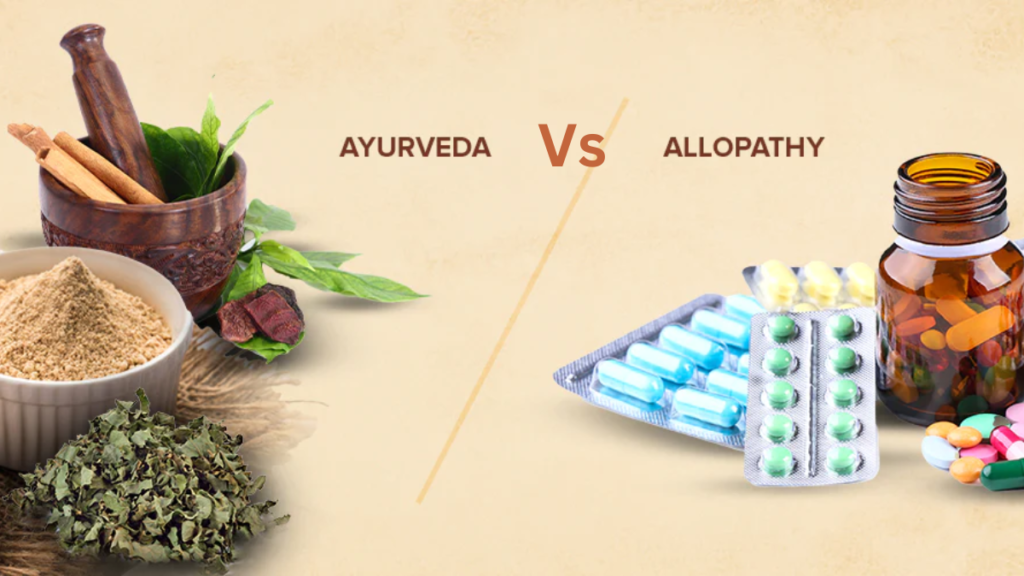India is known for its great culture, delicious food, and ancient medical practices, such as Ayurveda. While Ayurveda has its roots in the Vedas, an ancient Indian text, Allopathy is a term that refers to modern medicine. Ayurveda was the primary medical treatment system in India before modern medicine arrived. It is practiced by Vaidyas and Rishis who used their knowledge of the Vedas to treat all sorts of ailments. In the 1800s, Allopathy started gaining popularity and became the medical structure we have today. Ayurveda vs allopathy, we will which is better for today and how they both differ from each other.
What is Ayurveda?
Ayurveda is a kind of medicine that Indians have practiced for a long time. It is a natural way to treat diseases and focuses on keeping the body healthy overall. This method believes that we can heal our bodies and stay healthy by eating well and exercising regularly. In Ayurveda, people are classified based on five elements – earth(Bhoomi), air(Vaayu), water(Jalam), space(Akasha), and fire(Agni). These elements come together to form three life forces called Doshas. The combination of these doshas and elements determines a person’s personality and disposition. Doctors who practice Ayurveda use this classification to give treatment plans that suit each person.
What is Allopathy?
Allopathy is a term that is used to refer to all modern and scientific medicines and treatments. All medicines that fall under Allopathy have been clinically tested to ensure no adverse side effects when consumed. The goal of the term Allopathy is to treat any particular disease with an appropriate medicine that produces an opposite effect on the patient.
With advancements in Medicine, Allopathy is constantly evolving and changing. However, the term “allopathy” is becoming less used.
Ayurveda vs allopathy
It’s interesting to note that while Ayurveda and Allopathy may have some differences, they also share many similarities that are worth exploring. To help shed some light on this topic, let’s take a closer look at some of the major distinctions between the two approaches.
Meaning
Two words make up the word Ayurveda. Ayurveda means “Intelligence or Knowledge of Life,” as “Ayus” means “life” and “Veda” means “Science or Intelligence.” However, the word allopathy comes from Greek. First, “pathos” implies sickness, and “állos” means different; used together, they signify “something other than illness.”
Focus
The goal of Ayurveda is to heal all bodily illnesses naturally. Ayurvedic physicians will use complementary medicine to address mental as well as physical wellness. Allopathy is supported by science, though. Every medication and therapy used in allopathy has undergone clinical testing to treat illnesses and diseases.
Way of Treatment
Ayurveda has a more complete approach. Ayurvedic physicians identify the underlying cause of the issue and then devise a strategy to eradicate it. Together with physical health, mental health is taken care of during this treatment. Consequently, an allopathic approach is not comprehensive. Doctors of allopathy will diagnose and cure illnesses on the spot. The goal of allopathy is to swiftly heal any type of physical illness.
Long-term effect
Treatments using Ayurveda are longer-lasting. It extends beyond offering prompt comfort and prompt treatment of any illness. As previously mentioned, the patient’s general quality of life will improve when the underlying source of the issue is addressed. Allopathy will eliminate the immediate issue, but the remedy is temporary. The same method will be used to address any future problems that may emerge. Using microorganisms as an example, this can be understood. While allopathy kills the germs but leaves behind remnants that may reappear later, Ayurveda eliminates the bacteria from the body permanently.
Cost-effectiveness
The price differential between allopathy and ayurveda is another important distinction. The cost of Ayurveda is substantially less than that of Allopathy. The government’s regulation and price control of allopathic drugs is a significant contributing factor. The government, however, has little oversight over ayurvedic drugs. Although manufacturers are allowed to choose their rates, they frequently do so in an accessible range. This also applies to Ayurvedic and allopathic procedures and therapies. Treatments with Ayurveda are far less expensive, and repeat visits are not necessary.
Side Effects and Healing Time
Ayurveda is a natural approach to patient diagnosis and care. Because of this, there are extremely few negative effects and longer-lasting benefits. The nature of Ayurveda means that healing takes a long time, while allopathy heals faster and has more immediate results. Furthermore, because allopathy uses medications with a chemical basis, its negative effects may be more severe.
This is the analysis of Ayurveda vs allopathy. If we look from away both have their advantages and disadvantages. we need to focus on how it going to help us. Avanthi Ayurveda gives you the best treatment for major diseases like diabetes, hair fall, Vitiligo, etc.

